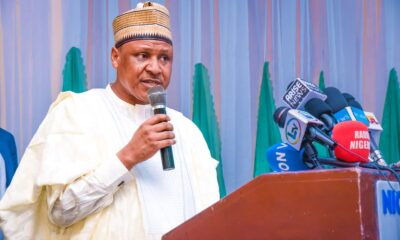The Federal Government on Thursday began uploading the data of 60 terrorists and other criminals to the International Criminal Police Organisation database.
The terrorists and the other criminals were among those who escaped when a terrorist group, the Islamic State of West African Province , bombed the Kuje Correctional Centre on Tuesday night.
As of press time, it was learnt that the details of most of the escapees had already been uploaded.
The Spokesman, Nigeria Correctional Service, Umar Abubakar on Thursday disclosed that the names, pictures and other data of the inmates have been circulated to other security agencies.
When asked if the NCoS has dispatched the data of the terrorists to Interpol, Abubakar said, “They are working on it; the ones they uploaded are not too clear to my liking and the management’s liking. Hopefully, they should be through tonight.
“Yes, we have access to the (Interpol) database. Every inmate or suspect that is brought to our facility, we photograph him and have the details about him before it goes to our database.
“They are trying to upload it and work on it so we can have the details of the offences committed and have the next-of-kin and take appropriate actions.”
Asked if the service had alerted other security agencies to look out for the fleeing inmates, Abubakar stated, “Yes, we have sent the list to other security agencies but the issue is that we want to upload the information with their pictures captured for easy identification by this night (Thursday) or earliest tomorrow morning (Friday); by 8am, we should be through.”
A senior officer disclosed that the walls are being fortified as directed by the government.
Responding to claims that there were no close circuit cameras at the facility, a senior officer who spoke on condition of anonymity dismissed it as untrue.
He stated, “The prison has CCTVs, it is just that the cameras do not cover as far as the gate where the soldiers are. But within the walls, there is CCTV. The pictures of the fleeing inmates have been sent to Interpol.”
It was learnt that Mustapha Umar, a man who was convicted and sentenced to life in prison by a Federal High Court in 2013 for bombing the Kaduna office of ThisDay newspapers is among the 60 Boko Haram members that escaped when terrorists attacked the Kuje Correctional Centre in Abuja on Tuesday.
Justice Adeniyi Ademola had ordered that Mustapha spend the rest of his life in jail for bombing the office of ThisDay using 12 camp gas cylinders in 2012. A list of the fleeing inmates showed that some suspected Boko Haram members currently standing trial are among the fleeing inmates.
Yasir Salihu aka Dan Birni, an avowed Boko Haram member who confessed to killing influential Kaduna cleric, Sheikh Auwal Albani, on the order of the late Boko Haram leader, Abubakar Shekau, is also among those who escaped. Also on the list is Kyari Goni, a former commander from Shekau’s faction who willingly surrendered to the military.
Others on the list are: Shehu Abdullahi, Suleiman Idi, Suleiman Zacharia, Yakubu Abdullahi, Yasir Salihu, Yunusa Mukaiya, Bello Haruna, Biliyaminu Usman, Sunday Michael, Bello Haruna, Bilyaminu Usman, Bukar Ali, Ibrahim Mohammed, Ikya Abur, Ismail Abdullahi, Modu Aji, Mohammed Sani, Musa Abubakar, Fannami Bukar, Faruku Waziri, Hassan Hassan, Ibrahim Musa, Idris Ojo and Ishaq Farouq
Mohammed Guja, Mohammed Buba, Abdulmannan Obadiki, Abubakar Musa, Abubakar Umar, Adamu Mohammed, Ahmadu Hagola, Asama Kanti, Baluye Modu, Bassey Kingsley, Diko Iko, Abdulkareem Musa, Andulsalami Adamu, Abubakar Habibu, Abubhakar Sadiq, and Abubakar Mohammed were also listed.
FG alerts Interpol
It was gathered that the process of uploading the data of 60 escaped terrorists and other criminals to the International Criminal Police Organisation database had begun.
The Spokesman, Nigeria Correctional Service, Umar Abubakar, who said this on Thursday, disclosed that the names, pictures and other data of the inmates havd been circulated to other security agencies.
When asked if the NCoS has dispatched the data of the terrorists to Interpol, Abubakar said, “They are working on it; the ones they uploaded are not too clear to my liking and the management’s liking. Hopefully, they should be through tonight.
“Yes, we have access to the (Interpol) database. Every inmate or suspect that is brought to our facility, we photograph him and have the details about him before it goes to our database.
A senior officer disclosed that the walls are being fortified as directed by the government.
Responding to claims that there were no close circuit cameras at the facility, a senior officer who spoke on condition of anonymity dismissed it as untrue.
He stated, “The prison has CCTVs, it is just that the cameras do not cover as far as the gate where the soldiers are. But within the walls, there is CCTV. The pictures of the fleeing inmates have been sent to Interpol.”
Meanwhile, Ogbeni Rauf Aregbesola, the Minister of Interior, says an alert has been sent to all checkpoints across the country as officials of the Nigeria Immigration Service had been put on notice.
In a statement on Thursday, Aregbesola admitted that correctional centres across the country could only contain internal attacks but cannot withstand external force.
FG alerts immigration
In a statement by his Spokesman, Sola Fasure, titled, ‘Armed Invasion of Kuje Correctional Centre’, Aregbesola said from all indication, Boko Haram terrorists were behind the attack.
“As we speak, security personnel are combing the whole area, up to a distance of 100km radius, looking for them. All checkpoints nationwide have been put on alert. More than 400 of them have been brought in and more are still coming,” he stated.
He added, “After the Abolongo, Oyo State, attack on a correctional facility, in October last year, it became apparent that a new form of attack for which our system was not prepared had emerged. Our system was primed to prevent and foil internal disturbance and riots, not external attacks/invasions since the facilities were usually built around police and military formations.”
In a statement, the Spokesperson for the Zamfara State police command Mohammed Shehu, said the command had intensified efforts to ensure adequate security at all the major roads in the state.
Also, the Ogun state police command on Thursday said the command had deployed heavy presence of police around the correctional centres to avert any attack.
The Police Public Relations Officer, Abimbola Oyeyemi, therefore stated that there was no cause for alarm.
In Katsina State, the police and immigration said the appropriate security arrangements were already in place to prevent escapees from Kuje to use borders in the state to escape from Nigeria.
The Spokesman for the Katsina NIS, Kabir Lawal, said that although Jibia and Kongolam border posts were under separate commands and not under Katsina, the NIS had appropriate security arrangements to prevent miscreants from using Katsina borders as their escape routes to neighbouring countries.
The Spokesman for the Katsina State police command, Gambo Isah, in his reaction said the command had the responsibility of ensuring safety of lives and property in the state.
Meanwhile, a tally showed that no fewer than 4, 443 inmates are on the run after nine successful jailbreaks in the last seven years. Aregbesola had stated in December last year that 3,906 inmates were still on the run. With 443 having escaped on Tuesday night, the figure is now about 4, 443.
Analysis also revealed, that 18 jailbreak incidents have been reported since the commencement of the Buhari led administration with nine successful attempts.
Between October 2020 and July 5,2022, correctional centres in 11 states and the Federal Capital Territory have witnessed several jailbreaks.
According to the Ministry of Interior, a total of 1,993 inmates were freed from two Nigerian Correctional Service Custodial Centres in Benin City and Oko in Edo State in October 2020.
On October 22, 2020, a total of 58 inmates were released from the facility in Okitipupa local government of Ondo State, after thugs broke in. The attackers destroyed properties belonging to the prison and injured staff on the premises.
On the same day, October 22, 2020, three attempts were foiled at the Ikoyi facility, Lagos, Afara Umuahia Correctional Centre, Abia, NCOS Warri, Delta state. However, the foiled attack led to the death of warder.
Six months later, on April 5, 2021, the Ikoyi centre witnessed another attack which was described by the Minister of Interior, Rauf Aregebesola, as the worst in the recent history of the country, hoodlums broke into the correctional facility with explosives and dynamite and freed about 1844 inmates in an operation that lasted from 1am to 3am.
On April 4, 2021, gunmen attacked a correctional centre in Owerri, the state capital, and freed 1,844 prisoners. Officials said in all, 84 inmates were returned to the facility.
On April 9, 2021, two officials of the Nigerian Correctional Service in Bauchi sustained injuries after a riot at the facility. Five of the inmates were injured in the process, but no inmates were able to escape after the riot.
Also, on September 13, 2021, armed men attacked the prison facility in Kabba, Kogi, North-central Nigeria, killing two officials and freeing 240 inmates.
On October 22, 2021, the Abolongo Custodial Centre was attacked and 837 inmates escaped from the facility, but the interior ministry said 262 had been recaptured.
On November 28, 2021: The most recent jailbreak occurred on Sunday when gunmen stormed the medium security custodial centre, Jos, releasing 262. At least 10 inmates were killed during the encounter and one security personnel also died. So far in 2022, a total of three attacks have been reported while two have been unsuccessful.
A security expert, Chidi Omeje in an interview stressed the need for the effectiveness of security operatives in the country.
Another security expert, Nnamdi Anekwe stressed the need for a reform of the prison system.
Lawan laments
In a related development, President of the Senate, Ahmad Lawan has said that Tuesday’s attack on the Kuje Medium Security Custodial Centre by terrorists speaks volumes about the failure of the country’s security architecture.
Lawan who led a delegation of the leadership of the Senate to assess the level of attack on the correctional facility, faulted the prisons authorities for not providing Closed Circuit Television at the Kuje correctional facility and others across the country.
He added, “The attack on this correctional facility is symptomatic of the failure of security failure. The attack is only a culmination of the failure of security systems.
“We were told that an estimated 300 terrorists attacked this facility. They came on foot, and I believe they should have been detected. In the first place, 300 people will not come for an operation like this without planning. Planning must have taken a week, a month or a bit more.
Briefing the lawmakers earlier, the Commanding Officer of the Nigerian Army Battalion in Gwagwalada, Lieutenant Colonel Adisa, told the Senate Leadership that over three hundred insurgents were behind Tuesday’s attack on the Kuje medium security custodial facility.
According to him, only a total of 50 security operatives were on the ground when the terrorists armed with IEDs stormed the facility to release the insurgents.
Reacting to the jail break, rights activist, Femi Falana (SAN), has alleged the Federal Government had foreknowledge of the Kuje attack.
Falana said this at the Nigerian Institute of Quantity Surveyors, Lagos State Chapter’s 14th Distinguished Lecture Series themed “Professionals in Partisan Politics: Appraising their roles in Envisioning Economic Growth and Development of Nigeria,” held in Lagos on Thursday.
He accused the Federal Government of merely creating a false impression of concern, and that the government indeed knew about the attack at the medium-security facility.
In a related development, the International Organisation for Peace-building and Social Justice has said the Islamic for West Africa Province activities against state targets have reduced the capacity of security operatives in the country.
The organisation said the activities of ISWAP showed that the group was more tactical in their operations than the Boko Haram terrorists.
A report by the organisation released on Tuesday added that despite the killing of their key leader in 2021, ISWAP had recruited more than 5,000 fighters.
The report partly read, “The emergence of ISWAP as the regnant Islamist extremist organisation in Nigeria is a concerning development. The group has concentrated its activities against state targets, reducing the capacity of the military, police, and security services, whilst impacting morale.”
Credit: The Punch


 BIG STORY4 days ago
BIG STORY4 days ago
 BIG STORY5 days ago
BIG STORY5 days ago
 BIG STORY4 days ago
BIG STORY4 days ago
 BIG STORY1 day ago
BIG STORY1 day ago
 BIG STORY4 days ago
BIG STORY4 days ago
 BIG STORY4 days ago
BIG STORY4 days ago
 BIG STORY4 days ago
BIG STORY4 days ago
 BIG STORY1 day ago
BIG STORY1 day ago




















